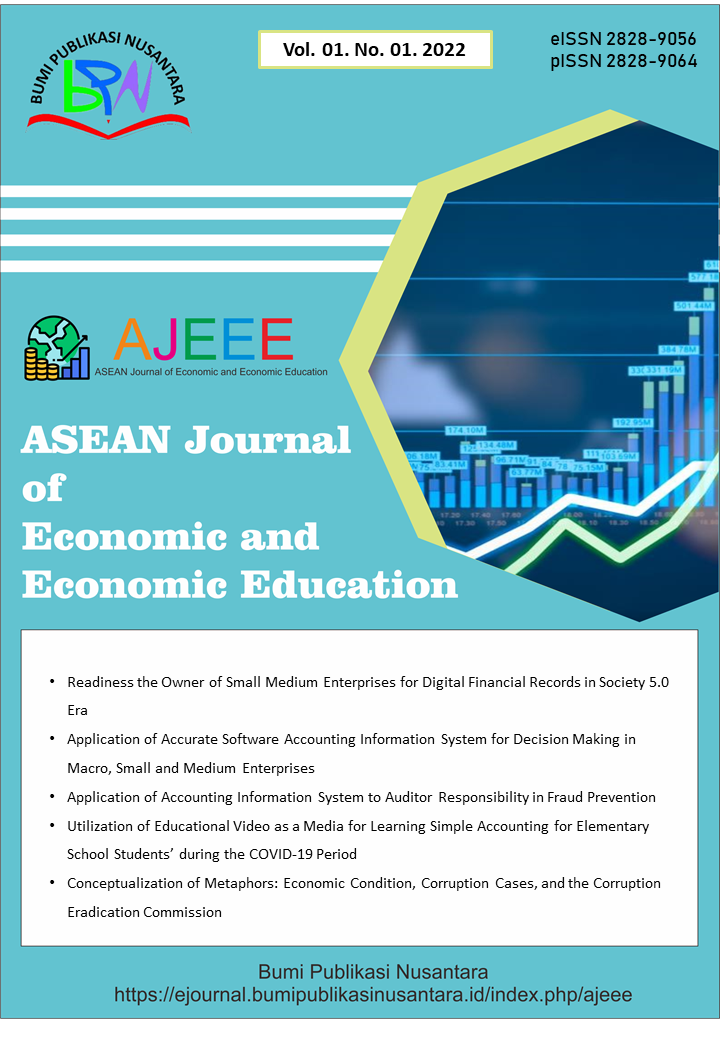Entrepreneurship Education and Self-employment Intentions: A Review
 ), Emmanuel Makanjuola Ogunjemilua(2),
), Emmanuel Makanjuola Ogunjemilua(2),
(1) Joseph Ayo Babalola University
(2) Joseph Ayo Babalola University
 Corresponding Author
Corresponding Author
Abstract
Keywords
References
Aboobaker, N., and Reinjin, D. (2020). Human capital and entrepreneurial intentions: Do entrepreneurship education and training provided by universities add value?. On the Horizon, 28(2), 73–83.
Adeel, S, Daniel A.D and Botelho A (2023) The effect of entrepreneurship education on the determinants of entrepreneurial behaviour among higher education students: A multigroup analysis. Journals of Innovation and Knowledge, 8, 1-12.
Aga, M. K. (2023). The mediating role of perceived behavioral control in the relationship between entrepreneurship education and entrepreneurial intentions of university students in Ethiopia. Journal of Innovation and Entrepreneurship, 12(1), 32.
Ajzen, I. (1991). The theory of planned behaviour. Organizational Behaviour and Human Decision Processes, 50(2), 179–211.
Bandura, A (2000). Exercise of human agency through collective efficacy. Current Directions of Psychological Science, 9,75-80
Bandura, A. (1986) The explanatory and perdictive scope of self-efficacy theory. Journal of Clinical and Social Psychology, 4, 359-373.
Boahemaah L, Xin, L, Dobge, C.S and Pomegbe, W. (2020). The impact of entrepreneurship education on the entrepreneurial intention of students in tertiary institutions. International Journal of Management, Accounting and Economics, 7(4), 123–140.
Breaugh, J. A. (1999). Further investigation of the work autonomy scales: Two studies. Journal of Business and Psychology, 13(3), 357-373.
Cotton. B, and Cachon J., C. (1987). Entrepreneurial Pedagogy. Business Education, 6(3), 17-29.
Faloye, D., and Olatunji, O. (2019). Entrepreneurship education and self-employment intentions among fresh graduates in Nigeria. Journal of Economics and Sustainable Development, 9(12), 144–158.
Ireland, R. D., Tihanyi, I., and Webb, J. W (2008). A tale of two politico-economic systems: Implications for entrepreneurship in central and eastern Europe. Entrepreneurship: Theory and Practice, 32(1) 107-130.
Jena, R. K. (2020). Measuring the impact of business management student’s attitude towards entrepreneurship education on entrepreneurship intention: A case study. Computers in Human Behavior, 107, 106275.
Jia, C., Zuo, J., and Lu, W. (2021). Influence of entrepreneurship education on employment quality and employment willingness. International Journal of Emerging Technologies in Learning (iJET), 16(16), 65.
Keat, O. Y., Selvarajah, C., and Meyer, D. (2011). Inclination towards entrepreneurship among university students: an empirical study of Malaysian university students. International Journal of Business and Social Science, 2(4), 206–220.
Kisubi, M., Korir, M., and Bonuke, R. (2021). Entrepreneurial education and self-employment: does entrepreneurial self-efficacy matter?. SEISENSE Business Review, 1(1), 18–30.
Krueger, N., F and Carsrud, A., L (1993) Entrepreneurial Intentions: Applying the theory of planned behaviour. Entrepreneurship and Regional Development, 5(4) 315-330.
Kurczewska, A. (2011). Entrepreneurship as an element of academic education-international experiences and lessons for Poland. International Journal of Management and Economics, 30, 217–233.
Kusumojanto, D. D., Wibowo, A., Kustiandi, J., and Narmaditya, B. S. (2021). Do entrepreneurship education and environment promote students’ entrepreneurial intention? The role of entrepreneurial attitude. Cogent Education, 8(1), 1948660.
Lange, T. (2012) Job satisfaction and self-employment: Autonomy or personality? Small Business Economics, 38(2), 165-177
Lv, Y., Chen, Y., Sha, Y., Wang, J., An, L., Chen, T., Huang, X., Huang, Y., and Huang, L. (2021). how entrepreneurship education at universities influences entrepreneurial intention: Mediating effect based on entrepreneurial competence. Frontiers in Psychology, 12, 655868.
Magasi, C. (2022). The influence of entrepreneurship education on entrepreneurial intentions: Perception of higher business education graduates. International Journal of Research in Business and Social Science (2147- 4478), 11(2), 371–380.
Mamman, J. (2019). Entrepreneurship education and self-employment intention: The case of students in Kwara State Universities. Africa Journal of Technical and Vocational Education and Training, 4(1), 128–138.
Marini, C. K., and Hamidah, S. (2014). The effects of self-efficacy, family environment, and school environment on the entrepreneurship interest of the culinary service department. Jurnal Pendidikan Vokasi, 4(2), 195-207.
Monteiro, S., Ferreira, J. A., and Almeida, L. S. (2020). Self-perceived competency and self-perceived employability in higher education: The mediating role of career adaptability. Journal of Further and Higher Education, 44(3), 408–422.
Neergaard. H, Robinson.S., and Jones.S (2021) Transformative learning in entrepreneurship education process: The role of pedagogical nudging and reflection. International Journal of Entrepreneurial Behaviour and Research, 27(1) 251-277.
Ozaralli, N., and Rivenburgh, N. K. (2016). Entrepreneurial intention: antecedents to entrepreneurial behavior in the USA and Turkey. Journal of Global Entrepreneurship Research, 6(1), 1–32.
Rakib, M.,Tawe, A., Azis,M., Syam, A., and Sanusi, D., A. (2020). Determinant of Entrepreneurial intention: Emipirical studay of student Entrepreneurs. Academy of Entrepreneurship Journal, 26(3), 1–12.
Rosmiati, R., Junias, D. T. S., and Munawar, M. (2015). Sikap, motivasi, dan minat berwirausaha mahasiswa. Jurnal Manajemen Dan Kewirausahaan (Journal of Management and Entrepreneurship), 17(1), 21–30.
Soomro, B. A., and Shah, N. (2022). Entrepreneurship education, entrepreneurial self-efficacy, need for achievement and entrepreneurial intention among commerce students in Pakistan. Education + Training, 64(1), 107–125.
Sugianingrat, I. A. P. W., Wilyadewi, I. I. D. A. Y., and Sarmawa, I. W. G. (2020). Determination of entrepreneurship education, family environment, and self-efficacy on entrepreneurship interest. Jurnal Economia, 16(1), 33–43.
Ucbasaran, D., Westhead, P., Wright, M., and Flores, M. (2010). The nature of entrepreneurial, business failure and comparative optimis. Journal of Business Venturing, 23(2021), 541-555.
Vuong, B. N., Phuong, N. N. D., Huan, D. D., and Quan, T. N. (2020). A model of factors affecting entrepreneurial intention among information technology students in Vietnam. The Journal of Asian Finance, Economics and Business, 7(8), 461–472.
Wardana, L. W., Narmaditya, B. S., Wibowo, A., Mahendra, A. M., Wibowo, N. A., Harwida, G., and Rohman, A. N. (2020). The impact of entrepreneurship education and students’ entrepreneurial mindset: The mediating role of attitude and self-efficacy. Heliyon, 6(9), e04922.
Wibowo, A., and Saptono, A., Suparno. (2018). Does teachers’creativity impact on vocational students’entrepreneurship intention?. Journal of Entrepreneurship Education, 21(3), 1–12.
Wu, S. and Wu, L. (2008) The impact of higher education on entrepreneurial intention of university students in China. Journal of Small and Entreprise Dvelopment, 15(4), 752-774.
Yang, J (2013), The theory of planned behaviour and prediction of entrepreneurial intention among Chinese undergraduates. Social Behaviour and Personality. 41(3) 367-376.
Yousaf, U., Ali, S. A., Ahmed, M., Usman, B., and Sameer, I. (2021). From entrepreneurial education to entrepreneurial intention: A sequential mediation of self-efficacy and entrepreneurial attitude. International Journal of Innovation Science, 13(3), 364–380.
Article Metrics
Abstract View : 639 times
: 639 times Download : 1185 times
Download : 1185 times
Refbacks
- There are currently no refbacks.
Copyright (c) 2025 Bumi Publikasi Nusantara

This work is licensed under a Creative Commons Attribution-ShareAlike 4.0 International License.



_publication_ethics1.png)



